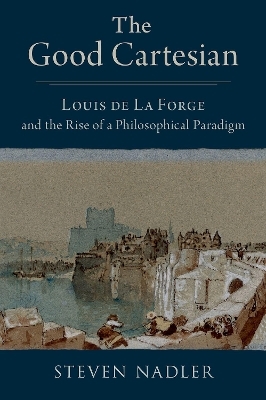
The Good Cartesian
Oxford University Press Inc (Verlag)
978-0-19-767171-9 (ISBN)
La Forge began his Cartesian career by providing wood-cut illustrations and an extensive commentary for the 1664 edition of Descartes' Traité de l'homme, the first original-language publication of part of the larger, groundbreaking treatise Le Monde that was left unpublished in Descartes' lifetime. In his commentary, La Forge is a devoted and faithful but not uncritical disciple who defends, supplements, updates and even corrects Descartes' account of the human body, which treats it as a “machine” that operates on the principles of the mechanical philosophy. In 1666, La Forge published his own Traité de l'esprit de l'homme, a treatise on the human mind. Explaining the mind and its union with the body was something that Descartes had long planned to do but never really carried out in a systematic manner. La Forge's most innovative and influential philosophical contribution in the Traité--one which goes beyond anything Descartes envisioned--is his limited version of the doctrine of occasionalism, which accords God an active and ongoing causal role in the world and reduces natural substances to being “occasions” for God's efficacious activity. La Forge thereby set the stage for later, even more unorthodox developments in Cartesianism.
Steven Nadler is William F. Vilas Research Professor and the William H. Hay II Professor of Philosophy at the University of Wisconsin-Madison, where he is also director of the Institute for Research in the Humanities and affiliated with the Mosse/Weinstein Center for Jewish Studies. He has been editor of the Archiv für Geschichte der Philosophie and of the Journal of the History of Philosophy, and he is currently president of the Journal of the History of Philosophy, Inc. He has served a term as president of the Central Division of the American Philosophical Association. In 2020, he was elected a member of the American Academy of Arts and Sciences.
List of Figures
Introduction
1. Louis de La Forge
2. Cartesianism, 1650-1663
3. Illustrating the World
4. A Disciple's Commentary
5. The Cartesian Mind
6. The Union of Mind and Body
7. Occasionalisms
8. The World of Bodies
9. Mind and Motion
10. Ideas and Volitions
Conclusion
Notes
Bibliography
Index
| Erscheinungsdatum | 25.04.2024 |
|---|---|
| Zusatzinfo | 23 b/w illustrations |
| Verlagsort | New York |
| Sprache | englisch |
| Maße | 226 x 150 mm |
| Gewicht | 635 g |
| Themenwelt | Geisteswissenschaften ► Philosophie ► Geschichte der Philosophie |
| Geisteswissenschaften ► Philosophie ► Metaphysik / Ontologie | |
| Geisteswissenschaften ► Philosophie ► Philosophie der Neuzeit | |
| Naturwissenschaften | |
| Sozialwissenschaften | |
| ISBN-10 | 0-19-767171-3 / 0197671713 |
| ISBN-13 | 978-0-19-767171-9 / 9780197671719 |
| Zustand | Neuware |
| Informationen gemäß Produktsicherheitsverordnung (GPSR) | |
| Haben Sie eine Frage zum Produkt? |
aus dem Bereich


